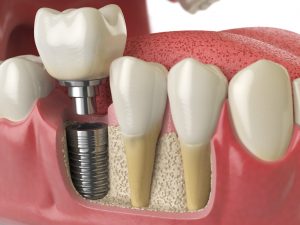Do you have missing teeth?
Few of us make it through life with a full set of 32 teeth. Even before age 64, the average adult loses approximately four teeth, according to research from the National Institute of Dental and Craniofacial Research. Other estimates show that most Americans have lost 12 teeth by age 50.
For many years, bridges and dentures were the only options for people with missing teeth. But the advent of implants have made it possible for people to regain the experience of having a full set of teeth. If you’re looking for the best dental implants available, you’ll need to find a world-class provider. While the material and type of implants don’t vary much (more on that below), you will encounter differences in a provider’s skill level. That’s why it’s so important to choose a highly experienced dentist to perform this procedure.
Why Do People Lose Teeth?
There are many possible reasons why a person loses teeth. The most obvious is dental decay (a cavity), which occurs when bacteria bore into the teeth over a long period. If a cavity goes untreated, a serious infection can develop in the tooth root. While the tooth can often be saved through root canal therapy—which cleans out the infected pulp and places a seal over the tooth—tooth extraction will be performed if the tooth cannot be saved.
Broken teeth are another cause of tooth loss—whether that happens because of an accident, chewing on hard foods, or nighttime teeth grinding over an extended period of time. While a tooth break may be minor at first, treatment is necessary to prevent the break from extending into the tooth root. Again, extraction is required only when a root canal procedure is no longer feasible.
Gum disease is another leading cause of tooth loss. When the gums are inflamed and bleeding, it indicates the presence of some degree of gum disease. Gum recession can leave the teeth roots exposed, eventually causing the teeth to become loose in their sockets. According to the Centers for Disease Control and Prevention, half of Americans over age 30 have some form of periodontitis. Early and consistent periodontal treatment greatly reduces your risk of losing teeth as a result of gum recession.
The Consequences of Missing Teeth
Losing even just one tooth can cause the surrounding teeth to shift, drifting towards the open space. This can affect the way you chew food and speak, and can make it harder to clean teeth properly––thus increasing the risk of further cavities in that area of the mouth.
Even within the first year of losing a tooth, most patients experience a 25% decrease in bone width in the jaw. A missing tooth will impact the aesthetics of the face as a result of this bone loss. As bone loss progresses, the distance from the nose to chin can decrease, causing the lower third of the face to partially collapse. Sagging can be prevented through early treatment with dental implants, which not only help you avoid losing jawbone, but also stimulate bone growth the way a normal tooth would.
What Is a Dental Implant, Anyway?
An implant consists of an artificial tooth (or false tooth) anchored to the jaw with a titanium base. This base must be surgically implanted into the jaw, which takes multiple office visits to prepare and perform. Once the implant has been inserted and the area has healed, the false tooth can be placed. Implants offer a long-term option for tooth replacement that looks indistinguishable from the other teeth. They can last for a lifetime when cared for properly.
What Are the Best Quality Dental Implants?
There are two major types of implants. Your eligibility depends on the status of your mouth before the procedure:
- Subperiosteal. If you lack the bone height necessary for a normal (endosteal) procedure, you may be recommended for this type of dental implant. A subperiosteal implant can be placed on top of the bone, which will not stimulate bone growth the way a normal implant would.
- Endosteal. This type of implant is placed directly into the jawbone and can hold one or more teeth. As the standard and best dental implant available, endosteal has the longest track record of success. If you don’t have enough bone height for the procedure, you may be able to get a bone augmentation in order to be eligible for an endosteal implant.
Who Is Best Qualified to Do Dental Implants?
If you have a missing tooth, getting a dental implant to replace it will confer health benefits for years to come. You’ll enjoy a full set of pearly whites and guard against bone loss as well as other dental conditions. But like any surgery, some cases are more complex than others.
The current state of your jawbone, your oral and overall health, and the number of replacements needed will determine the complexity of the procedure. The best way to find out whether you’re a viable candidate for dental implants is to consult with an experienced dentist.
Penn Dental Family Practice houses world-class talent in the field of dentistry. If you’re looking for a dentist who will do the procedure right the first time, we encourage you to choose us for your implant needs. As leaders in dental research and practice, we apply the most cutting-edge techniques and methods when performing oral surgery. We are your go-to provider for all types of implant and restorative dentistry problems. To schedule a consultation with one of our oral surgeons, please call 215-898-7337.
